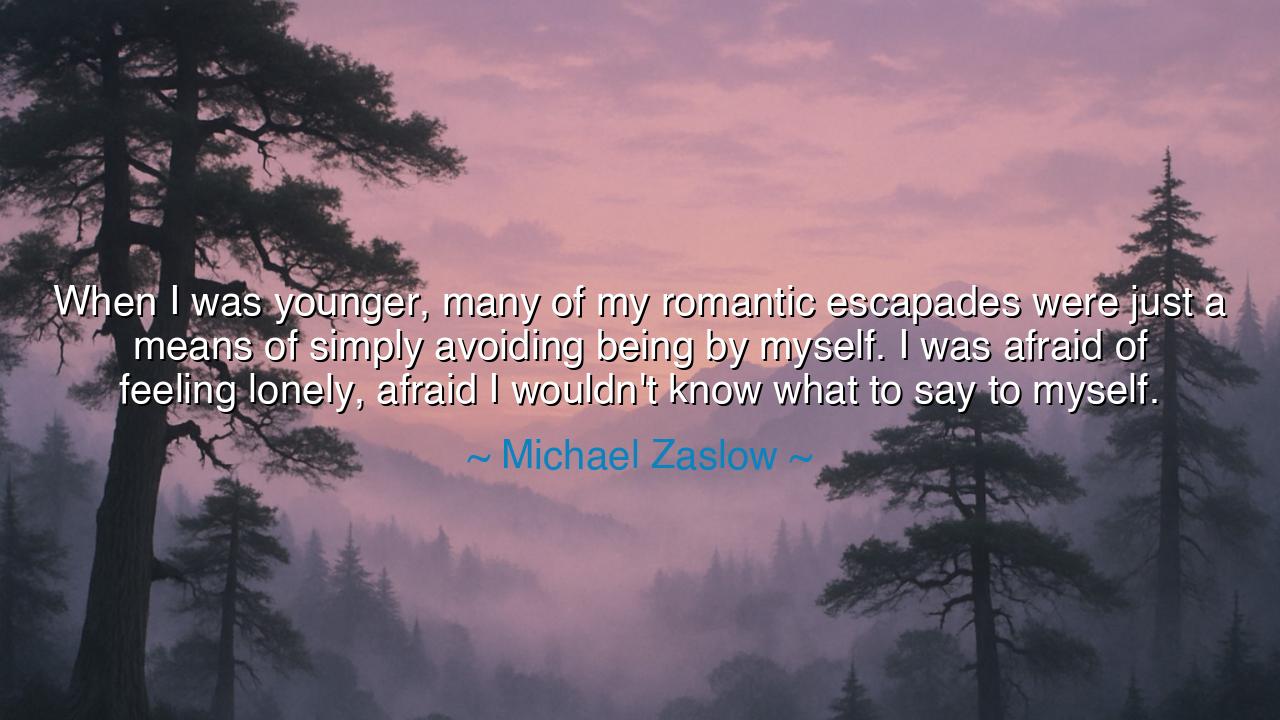
When I was younger, many of my romantic escapades were just a
When I was younger, many of my romantic escapades were just a means of simply avoiding being by myself. I was afraid of feeling lonely, afraid I wouldn't know what to say to myself.






"When I was younger, many of my romantic escapades were just a means of simply avoiding being by myself. I was afraid of feeling lonely, afraid I wouldn't know what to say to myself." – Michael Zaslow. These words carry a deep truth about the human condition, one that speaks to the profound fear we all harbor within us: the fear of loneliness. At the heart of Zaslow's admission lies an emotional struggle—an inner turmoil that has echoed throughout human history. For in the ancient world, as in the modern, to be alone is to confront one's most vulnerable self, to face the silence and the weight of one’s thoughts. To seek out the company of others, especially through romantic relationships, is often an act of self-preservation, a means of escaping the internal abyss of solitude.
In this pursuit, Zaslow’s reflection is not a condemnation, but a revelation. To seek love, companionship, or even fleeting romantic experiences to fill the void of self-doubt and fear of being alone is a timeless story. From the days of Socrates, who walked the streets of Athens asking questions to others rather than seeking the quietude of his own mind, to the modern individual, we find that we often turn outward in search of validation and meaning. But what is this true fear of loneliness? It is not simply the absence of others, but the absence of meaning in one's own company.
Consider the great philosopher Diogenes of Sinope, who, despite living alone in a barrel and rejecting the trappings of wealth and society, found the ultimate freedom in solitude. He showed that true contentment is not in the presence of others, but in the ability to be at peace with oneself. Yet Diogenes was an exception, not the rule. Most people, like Zaslow, would rather seek the company of others to avoid the confrontation with the self—the inner dialogue that can feel unbearable when one is left to their own thoughts. This is the essence of what Zaslow articulates: the discomfort of being alone, and the tendency to seek distraction through others.
But in this struggle, there is wisdom. The fear of loneliness is not a weakness, but a call to understand oneself more deeply. History is full of individuals who struggled with this very same fear, from the philosophers to the poets, each of whom faced their own moments of solitude and introspection. Take, for instance, Rainer Maria Rilke, the great German poet, who spent much of his early life in solitude, grappling with his own sense of isolation. In his famous Letters to a Young Poet, Rilke urged the young poet to "live the questions now," to embrace solitude and uncertainty as a means of personal growth. For Rilke, loneliness was not to be feared, but embraced as the fertile ground in which self-discovery could bloom.
The lesson to take from Zaslow’s quote is not simply about romantic relationships, but about the necessity of confronting our inner solitude. In the modern world, where distractions abound and relationships can often serve as a means of escape, we must remember that true growth comes from the willingness to be alone with ourselves. Self-reflection, the ability to sit with one’s thoughts and feelings, is a practice that strengthens the soul. By avoiding this internal work, we not only delay our personal growth but also risk relying on others for validation that we must first seek within ourselves.
To break free from the fear of loneliness, we must begin by embracing solitude. Like Socrates, who found wisdom in the quiet of his own mind, we must learn to sit in the silence and listen to our own thoughts, to understand our deepest desires, fears, and truths. Let us not be afraid of those quiet moments, for they are the very moments that offer us the clarity and strength to face the world with a sense of purpose and self-assurance.
In practical terms, this means that we must consciously create space for solitude in our lives, whether through moments of quiet reflection, journaling, or time spent in nature. It is in these moments that we can reconnect with the essence of who we truly are. When we come to terms with our own company, we find that we are no longer dependent on external validation. We are enough as we are. And in that self-sufficiency, we are able to build more meaningful relationships with others, relationships that are not based on the fear of being alone, but on the joy of companionship. In the end, it is only through facing the loneliness within that we can ever truly understand the fullness of our own being.






AAdministratorAdministrator
Welcome, honored guests. Please leave a comment, we will respond soon